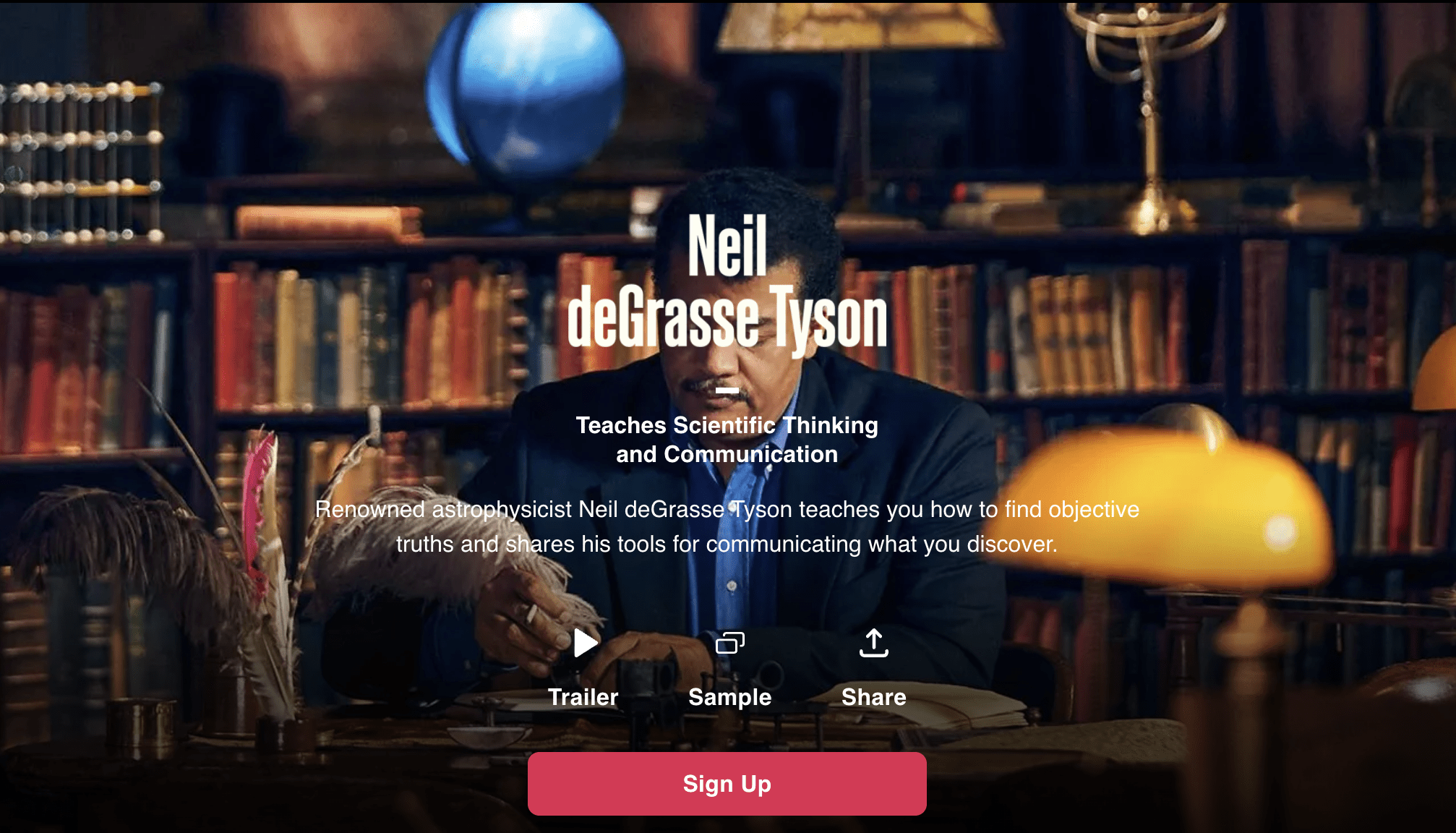Neil deGrasse Tyson is one of the most recognizable and respected scientists in the world.
His MasterClass on Scientific Thinking and Communication provides an exclusive look into his brilliant mind, teaching learners about how to think scientifically, communicate complex ideas effectively, and use data to support their arguments.
This class makes a perfect introduction for those just getting started in science or veterans looking to stay sharp, as well as anyone who wants to learn from one of the great minds of our generation.
In this Neil deGrasse Tyson MasterClass Review, we’ll take a closer look at what you can expect from taking this MasterClass.
Who Is Neil deGrasse Tyson?
Astrophysicist Neil deGrasse Tyson is also a prominent member of popular culture. Dr. Tyson walks the fine line between being a skilled scientific speaker and being a likable and welcoming person.
He is not what you would anticipate the Hayden Planetarium Director to be. If I were to describe him in a few words, I would use the phrase “curious-provoking.”
Dr. Tyson, a graduate of the city’s public schools, made progress throughout his life with the goal of becoming a scientist. At the age of 17, Tyson received an invitation from renowned scientist Carl Sagan to spend a day at Cornell University in Ithica.
In response to the visit, Tyson subsequently said, “I already knew I wanted to be a scientist. Carl, though, taught me what type of person I wanted to be that day.
Tyson has now achieved success as a planetary scientist, joined the ranks of social media celebrities, written books, created podcasts, and presented the provocative Cosmos: A Spacetime Odyssey.
I was so sure that his masterclass would teach me a lot about science and communication. And Dr. Tyson did not let me down.
Neil deGrasse Tyson MasterClass Pricing
The masterclass started experimenting with several subscription options in 2021 in addition to their initial flat-rate yearly membership of $180.
They ultimately chose a new, affordable three-tier MasterClass price structure for their yearly subscription:
- Family – $276 per year (average $23 per month)
- Duo – $240 per year (average $20 per month)
- Individual – $180 per year (average $15 per month)
The Individual membership, previously known as the “Standard Plan,” is ideal for single people who choose to study online at home.
Couples would benefit more from the Duo (formerly the “Plus Plan”) and Family (previously the “Premium Plan”) plans since MasterClass permits simultaneous viewing on several devices. (Netflix subscription plans have comparable limitations.)
People who may wish to watch MasterClass on their commute to work without using up much of their data may find it handy to have the option to download video courses for offline watching.
Users have the option to do it with the Plus and Premium subscriptions.
Personally, I choose the $180 yearly option since I take an average of one MasterClass each month, making each class $15.
7 Key Takeaways From Neil deGrasse Tyson MasterClass
Here are my top seven lessons learned from this course:
1. What appears pointless now could matter tomorrow:
When work on quantum physics first began in the 1920s, some individuals thought it was a waste of time since there was no immediate purpose for it.
However, the existence of the internet today is due to quantum physics. Digital information was produced, saved, and retrieved as a result.
2. If you pique your audience’s interest, they will discover more on their own:
When you just give someone all the facts about a subject, they will rapidly forget them. However, if you excite their interest, you may compel them to do independent research and develop into an authority on their own.
3. Even if you are correct, you won’t succeed if you can’t clearly explain your position:
This issue mostly relies on your target market. Even if you’re correct, it’s ineffective to tell someone they’re wrong outright. As an alternative, you mold your content to match their brain by being familiar with their cognitive processes and prejudices.
According to Tyson, your objective should be to make them remark, “Wow, I never thought about it that way,” rather than to shame or contradict them. I’m grateful.
Your message is still your message, but the audience you’re speaking to will affect how you present it.
4. Every measurement that has ever been performed and will ever be made has uncertainties:
The measurements come down to a rough estimate that you feel confident about.
For instance, it was found that the Earth’s rotation is slowing down while attempting to quantify the duration of one second, which altered how humans saw time.
But if we had just believed that all measures were perfectly precise, we would have never realized this.
When our measurement accuracy isn’t precise, things can be occurring that we wouldn’t truly know about.
5. The cosmological viewpoint:
Tyson often discusses the use of the cosmic viewpoint to demonstrate the absurdity of your ego.
Taking a larger view essentially resets your priorities. This may help you become more modest while eradicating cognitive bias, which occurs when we see patterns where none exist.
For instance, we think that aliens would resemble humans, although the majority of life on Earth doesn’t even resemble us.
We only recognize what is known to us; the cosmos is unaware of or unconcerned with us.
6. You have to be skeptical and make inquiries:
Being a skeptic is not always a negative thing. Bias is removed by skepticism, which prevents us from seeing objective truths.
It’s crucial to understand that skepticism does not entail open denial of anything you don’t wish to be true. It involves challenging your doubts while being open to acquiring reliable evidence.
One finding is not the solution, which is the beauty of science.
Tyson provides a compelling narrative to explain this. It was discovered by scientists that Uranus was defying Newton’s law of planetary motion.
When planets are that distant from the sun, does Newton’s law still hold true, they pondered. The most plausible possibility was that Uranus might be being pulled by another planet, which would explain its behavior.
7. They found Neptune by pointing their telescopes toward the right wing of the sky:
In a different instance, Mercury didn’t behave as predicted by Newton’s rule, leading us to believe that a planet that was nearer the sun was tugging Mercury in that direction.
This planet was even given a name (it was truly called Vulcan!) since scientists were so certain that they were correct once again.
Then came Einstein’s theory of relativity, which demonstrated that Newton’s law would become more distorted the closer anything approached the sun’s intense gravitational field.
This was the brand-new justification for Mercury’s actions. And it was only after accepting that there may be several solutions that we arrived there.
FAQs On Neil deGrasse Tyson MasterClass Review 2024
👉 Who is this class for?
This class is perfect for beginners as well as seasoned scientists who want to stay sharp in their skillset. It’s also suitable for anyone interested in learning from Neil deGrasse Tyson, one of the greatest minds of our time.
🤔 What will I learn in this MasterClass?
You’ll learn about how to think scientifically, communicate complex ideas effectively, and use data to support your arguments. You’ll also get an exclusive look into Neil deGrasse Tyson’s brilliant mind.
✔️ Is this class suitable for all levels of learners?
Yes! This course is designed to be accessible to all levels of learners. Whether you’re just getting started in science or a veteran looking to stay sharp, this course is sure to offer something for everyone.
⏳ How long does the course take to complete?
The course takes approximately 8 hours to complete. It consists of 10 lessons, each lasting around 45 minutes.
👉 What do I need to participate in this class?
You’ll need access to a computer with an internet connection and a microphone if you’d like to ask questions. Other than that, no prior knowledge is required.
Quick Links:
- Ken Honda Mindvalley Masterclasses Review
- Mindvalley Masterclass Review
- Masterclass Subscription: How Much Does Masterclass Cost?
- Robert Reffkin Masterclass Review
Conclusion: Neil deGrasse Tyson MasterClass Review 2024
Neil deGrasse Tyson’s MasterClass on Scientific Thinking and Communication offers an engaging examination of how humans think scientifically and communicate complex ideas.
With a wide range of topics covered and an engaging style, this course is sure to be an excellent choice for anyone looking to learn from one of the great minds of our generation.
It offers a comprehensive look at scientific thinking and communication that is accessible to all levels of learners.








